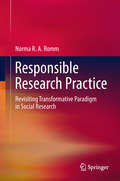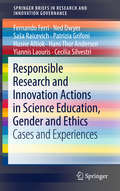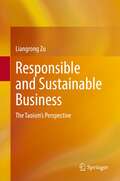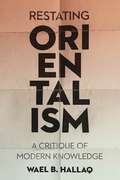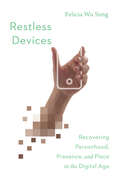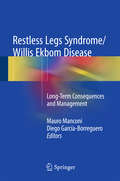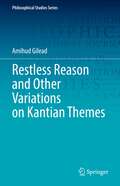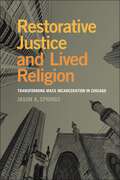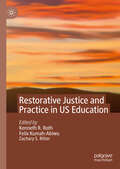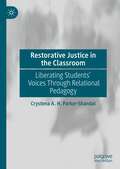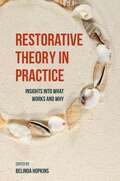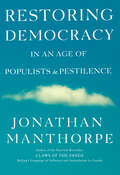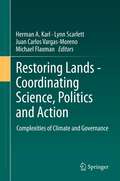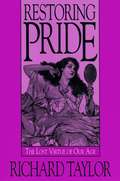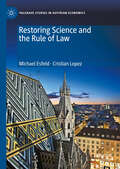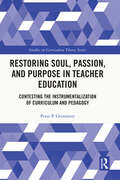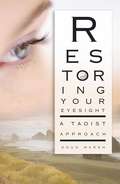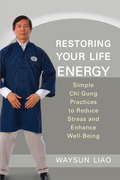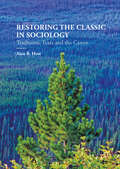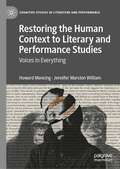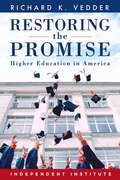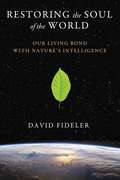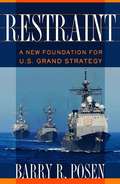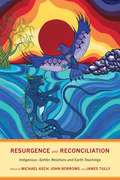- Table View
- List View
Responsible Research Practice
by Norma Ra RommThis book explores ways in which creative research practice can be explicitly and mindfully geared to make a difference to the quality of social and ecological existence. It offers a range of examples of how different research methods can be employed (and re-tuned) with this intention. The book suggests that what Romm names "active" research involves using the research space responsibly to open up new avenues for thinking and acting on the part of those involved in the inquiry and wider stakeholders. The book includes a discussion of a range of epistemological, ontological, methodological and axiological positions (or paradigms) that can be embraced by inquirers implicitly or explicitly. It details the contours of an epistemology where knowing is recognized to be grounded in social relations, as a matter of ethics. While focusing on discussing the “transformative paradigm” and attendant view of research ethics, it considers to what extent the borders between paradigms can be treated as being permeable in creative and active inquiries. Apart from considering options for enhancing responsible research practice during the process of inquiry (and reconsidering mixed-research designs) the book also considers options for responsible theorizing that is inspirational for pursuing goals of social and ecological justice.
Responsible Research and Innovation Actions in Science Education, Gender and Ethics: Cases and Experiences (SpringerBriefs in Research and Innovation Governance)
by Hans Thor Andersen Fernando Ferri Ned Dwyer Saša Raicevich Patrizia Grifoni Husne Altiok Yiannis Laouris Cecilia SilvestriThis book gathers case studies presented at the International Conference on Responsible Research and Innovation in Science, Innovation and Society (RRI-SIS2017). It highlights European initiatives and projects in various domains and contexts, each of which explores how to create guidelines and good practices for Responsible Research and Innovation and how to promote them among citizens, industry stakeholders, policy and decision makers, research funders and educational institutions to foster their adoption as a potential benchmark in establishing RRI processes. Further, the book discusses gender and ethical issues, which are highly relevant for RRI initiatives in connection with representativeness, risks and in some cases, minority rights.
Responsible and Sustainable Business: The Taoism's Perspective
by Liangrong ZuThis book claims that CSR is the Tao of sustainable enterprise development. It examines the intersection of practical wisdom of Taoism, CSR and Sustainability, looking at the theoretical and historical implications associated with a Taoist approach to CSR, sustainability and responsible leadership. Implications for sustainable enterprise development will be presented. The book analyzes perspectives found in Taoist classical texts and within the larger Chinese cultural context in order to delineate key issues found in the classical texts. Through these analyses, the book assesses the applicability of modern-day Taoism thought and practice in China and the West with respect to the contemporary sustainability situation. The book also explores the values, ideas and practices Taoism offers to inspire a new generation of leaders, and particularly business leaders to manage companies in a more social and sustainable way.
Restating Orientalism: A Critique of Modern Knowledge
by Wael HallaqSince Edward Said’s foundational work, Orientalism has been singled out for critique as the quintessential example of Western intellectuals’ collaboration with oppression. Controversies over the imbrications of knowledge and power and the complicity of Orientalism in the larger project of colonialism have been waged among generations of scholars. But has Orientalism come to stand in for all of the sins of European modernity, at the cost of neglecting the complicity of the rest of the academic disciplines?In this landmark theoretical investigation, Wael B. Hallaq reevaluates and deepens the critique of Orientalism in order to deploy it for rethinking the foundations of the modern project. Refusing to isolate or scapegoat Orientalism, Restating Orientalism extends the critique to other fields, from law, philosophy, and scientific inquiry to core ideas of academic thought such as sovereignty and the self. Hallaq traces their involvement in colonialism, mass annihilation, and systematic destruction of the natural world, interrogating and historicizing the set of causes that permitted modernity to wed knowledge to power. Restating Orientalism offers a bold rethinking of the theory of the author, the concept of sovereignty, and the place of the secular Western self in the modern project, reopening the problem of power and knowledge to an ethical critique and ultimately theorizing an exit from modernity’s predicaments. A remarkably ambitious attempt to overturn the foundations of a wide range of academic disciplines while also drawing on the best they have to offer, Restating Orientalism exposes the depth of academia’s lethal complicity in modern forms of capitalism, colonialism, and hegemonic power.
Restless Devices: Recovering Personhood, Presence, and Place in the Digital Age
by Felicia Wu SongWhat kind of people are we becoming with personal technologies in hand?And who do we really want to be?
Restless Legs Syndrome/Willis Ekbom Disease
by Mauro Manconi Diego García-BorregueroDue to the fact that Restless Legs Syndrome/Willis-Ekbom Disease is usually a chronic condition, this book aims to provide physicians with the necessary tools for the long-term management of patients with RLS. The first part of the book addresses the various comorbidities and long-term consequences of RLS on life quality, sleep, cognitive, psychiatric and cardiovascular systems, while the second part focuses on the management of long-term treatment and the drug-induced complications in primary RLS and in special populations. Written by experts in the field, this practical resource offers a high-quality, long-term management of RLS for neurologists, sleep clinicians, pulmonologists and other healthcare professionals.
Restless Reason and Other Variations on Kantian Themes (Philosophical Studies Series #147)
by Amihud GileadThis book, combining integratively-revised previously-published papers with entirely new chapters, challenges and treats some major problems in Kant’s philosophy not by means of new interpretations but by suggesting some variations on Kantian themes. Such variations are, in fact, reconstructions made according to Kantian ideas and principles and yet cannot be extracted as such directly from his writings. The book also analyses Kant's philosophy from a new metaphysical angle, based on the original metaphysics of the author, called panenmentalism. It reconstructs some missing links in Kant's philosophy, such as the idea of teleological time, which is vital for Kant's moral theory. Although these variations cannot be found literally in Kant’s works, they can be legitimately explicated, developed, and implied from them. Such is the case because these variations are strictly compatible with the details of the texts and the texts as wholes, and because they are systematically integrated. Their coherence supports their validation. The target audiences are graduate and PhD students as well as specialist researchers of Kant's philosophy.
Restoration of the Republic: The Jeffersonian Ideal in 21st Century America
by Gary HartInvestigates the relationship between rights and responsibilities.
Restorative Justice and Lived Religion: Transforming Mass Incarceration in Chicago (Religion and Social Transformation)
by Jason A. SpringsFrames restorative justice as a form of moral and spiritual practice with the capacity to transform injusticeIn the United States “restorative justice” typically refers to small-scale measures that divert alleged wrongdoers from a standard path through the criminal justice system by funneling them into alternative justice programs. These aim not to punish the offender, but to constructively address the harm that wrongdoing may have caused to individuals or to the community, engaging with the wrongdoer to come to a response that might heal and repair the harm.Yet restorative justice initiatives generally fail to challenge and transform the racist system of mass incarceration. This book argues that these initiatives have the potential to do so, but that we need to better understand what restorative justice is, and how it should be implemented. It claims that restorative justice can achieve its desired effect only insofar as it provides a mode of association between people that is, at its core, moral and spiritual. The book explores the ways in which restorative justice ethics and practices exhibit moral and spiritual dynamics, and what difference such “lived religious” dynamics can make for purposes of transforming structural violence.Looking to Chicago’s restorative justice network as a model for developing these transformational and sustainable social changes, the volume showcases real-life examples of the kinds of practices and initiatives needed to shift the entrenched dynamics that fuel the prison-industrial complex across the United States.
Restorative Justice and Practice in US Education
by Zachary S. Ritter Kenneth R. Roth Felix Kumah-AbiwuThis edited volume offers a comprehensive overview of the dual concepts of Restorative Justice as a legal remedy and Restorative Practice as a philosophy to reduce harm and build resilient and just communities within social, cultural, and educational institutions. With contributions from leading practitioners and scholars, the book serves as a valuable resource for institutions seeking to center equity and reduce harm in multicultural learning spaces. Chapters combine insights into the origins and intent of Restorative Justice and Practice, showcase some of their early applications in higher education settings and beyond, and highlight their potential for promoting peace and building community on campuses across the country.
Restorative Justice in the Classroom: Liberating Students’ Voices Through Relational Pedagogy
by Crystena A. Parker-ShandalThis book focuses on how teachers can transmit and practice values through classroom circles that attend to and empower all students’ voices. A growing number of teachers are using relational pedagogy, drawing on Indigenous circle practice, as a pedagogical tool. Done well, circles can build and sustain dialogue and peaceful relations. Done poorly, circles reflect and reinforce relations of power, which, if disregarded, can be damaging for participants whose voices are silenced or not sufficiently heard. Parker-Shandal’s consideration of teachers’ professional learning and training in restorative justice in education focuses on ethnographic, classroom-based research in diverse urban elementary schools. Her data include observations of classrooms, teacher surveys, and interviews with students, teachers, and principals. The book provides a detailed account of the lived experience of students and teachers as they engage with and experience the transformative power of constructive dialogue about conflicts embedded in curriculum subject matter through restorative justice pedagogies.
Restorative Theory in Practice: Insights Into What Works and Why
by Pam Denicolo Dorothy Vaandering Margaret Thorsborne Mark Vander Vennan Mo Felton Shona Cameron Belinda Hopkins Wendy Drewery Ann Shearer Juliet Starbuck Pete WallisRestorative practice is an innovative approach to thinking about, and addressing, conflict and bullying, as well as disruptive, challenging and criminal behaviour. The approach is increasingly used to transform the culture of organisations, institutions and services and the way people communicate with one another. In this book, ten practitioners describe a restorative encounter as seen through the lens of their own theoretical model. The book's unique structure is modelled on a restorative practice known as Circle Time- comprising of a Check-in, a Main Activity, and a Check-out. In the Check-in the practitioner explains how their own theoretical model informs their practice; in the Main Activity they comment on the same case studies to highlight how each theory can deepen our understanding of what might be happening and why; and in the Check-out they reflect on what they have learned from reading each other's contributions. This is a unique exemplar of how restorative theory and practice can influence how practitioners think, learn and write about restorative practice. This will be an invaluable resource for restorative practitioners working across sectors including education, social services, youth offending or policy.
Restoring Democracy in an Age of Populists and Pestilence
by Jonathan Manthorpe“This global affairs veteran has carved out a solid, mature path, including for ‘flawed democracies’ like the U.S. We’d all be wise to follow.” — Vancouver SunFrom the author of the Claws of the Panda, a Globe and Mail bestseller, Restoring Democracy is quite literally a book for our times. Manthorpe argues that democracy is more resilient than it appears, and is capable of overcoming the attacks from within and without that have sapped its vigour since the end of the Cold War. He begins with a description of the events of 1989, one of the seminal years in modern history. This saw the end of the Cold War, and the apparent conclusive victory of democracy and its civic values. But the view of these changes as a triumph of democracy — as summed up in Francis Fukuyama’s essay "The End of History" — was short-lived. Russia, shorn of its Soviet empire, and the Chinese Communist Party, re-examining its survival after the Tiananmen Square Massacre, began devising ways to counter-attack the West’s triumphalism and these met with considerable success. Internal pressures and contradictions — wealth disparity being chief among them — threaten the survival of many democratic systems. Abandoned industrial workers turn to the repeated platitudes designed to appeal to those left behind without actually offering them the ways and means to catch up. Immigrants, refugees, and the reformist fixations of isolated liberal elites have provided ammunition for would-be despots. Adding to the pressures building on the political norms of our democracies, the COVID-19 pandemic has brought economic and social stand-still for which no country is prepared.
Restoring Lands - Coordinating Science, Politics and Action
by Herman Karl Juan Carlos Vargas-Moreno Lynn Scarlett Michael FlaxmanEnvironmental issues, vast and varied in their details, unfold at the confluence of people and place. They present complexities in their biophysical details, their scope and scale, and the dynamic character of human action and natural systems. Addressing environmental issues often invokes tensions among battling interests and competing priorities. Air and water pollution, the effects of climate change, ecosystem transformations--these and other environmental issues involve scientific, social, economic, and institutional challenges. This book analyzes why tackling many of these problems is so difficult and why sustainability involves more than adoption of greener, cleaner technologies. Sustainability, as discussed in this book, involves knowledge flows and collaborative decision processes that integrate scientific and technological methods and tools, political and governance structures and regimes, and social and community values. The authors synthesize a holistic and adaptive approach to rethinking the framework for restoring healthy ecosystems that are the foundation for thriving communities and dynamic economies. This approach is that of collective action. Through their research and practical experiences, the authors have learned that much wisdom resides among diverse people in diverse communities. New collaborative decision-making institutions must reflect that diversity and tap into its wisdom while also strengthening linkages among scientists and decision makers. From the pre-publication reviews: "Finally, we have a book that explains how science is irrelevant without people. It's people who decide when and how to use science, not scientists. This book gives us a roadmap for how to really solve complex problems. It involves hard work, and creating new relationships between scientists and the public that don't typically exist in our society." -John M. Hagan, Ph.D. President, Manomet Center for Conservation Sciences
Restoring Pride: The Lost Virtue Of Our Age
by Richard TaylorThe ideas put forth in Restoring Pride will seem, to many readers, elitist. That's because they are. Richard Taylor rejects the popular notion that all people are equal, embracing instead the idea that some people are simply better than others as human beings. Their superiority has nothing to do with class, power, or wealth; they are better because they are gifted and have made the most of their gifts. Taylor doesn't try to be politically correct and makes no apologies; he explains what it means to be more than normal and encourages people to fulfill their potential. <P><P> Pride, according to Taylor, is the justified love of oneself for having achieved personal excellence. People who use their natural gifts for significant and lasting achievements have the right to be proud of themselves. Furthermore, virtually everyone is in some way gifted. Some people hone their talents and better themselves while others follow paths that are easy, pleasant, common. People who fail to nourish and perfect their talents, who do only what is expected of them, are wasting their lives. We all have gifts and we need to identify them and excel in the areas in which we're gifted. Put another way, figure out what you're good at . . . and do it. <P><P> Superior people, people who are justifiably proud, are not concerned with what others think of them, but with how they measure up in their own eyes. They are their own most demanding judges. Although proud people set their own standards higher, and make their own rules stricter than those others might subject them to, there is a rule of conduct that must guide their relations with other people: be considerate. If they adhere to this maxim when dealing with friends or strangers, with great and powerful people or people unknown, they will need no other rule of right and wrong. Taylor's definition of pride leaves no room for conceit. Arrogance and self-centered behavior, he believes, have no place in the lives of the proud.
Restoring Science and the Rule of Law (Palgrave Studies in Austrian Economics)
by Michael Esfeld Cristian LopezScience and the rule of law are the two pillars of modernity. Even though both result from the attempt to employ reason to limit the exercise of power in the scientific and the political sphere, they bear in themselves the germs of their own destruction: scientism and welfare totalitarianism. This book examines a trend towards a new, specifically postmodern totalitarianism, namely a regime of “actually existing postmodernism” that is based on the collusion of four elements: (i) scientism and its political use, (ii) intellectual postmodernism, (iii) welfare states, and (iv) crony capitalism. The book then shows a way out by utilising the philosophy of Descartes and Kant, the social-normative turn in the 20th century, and the resources of Austrian libertarianism from Hayek and Popper to Mises, Rothbard and Hoppe. These intellectual resources lay the ground for a New Enlightenment and an open society shaped by a free science and voluntary cooperation under the rule of law. Restoring Science and the Rule of Law is essential reading for philosophers of science and for political theorists interested in the foundations of the rule of law.
Restoring Soul, Passion, and Purpose in Teacher Education: Contesting the Instrumentalization of Curriculum and Pedagogy (Studies in Curriculum Theory Series)
by Peter P. GrimmettThis text both challenges and traces the development of a culture of regulation, standardization, performativity, and governmentality evident in Anglophone teaching practice and education. Framed by a brief history of teacher education research and policy in North America over the last six decades, the text argues that the instrumentalization of curriculum and pedagogy has robbed teachers of their pedagogical soul, passion, and purpose. Using a conceptual model, Grimmett forges a pathway for teachers to adopt a soulful way forward in professional practice, individually and collectively enhancing autonomy over programs, and protecting the public trust placed in them as educators. This text will benefit researchers, academics, and educators with an interest in teachers and teacher education, educational policy and politics, and curriculum thinking and enactment more broadly. Those specifically interested in pedagogy, educational change and reform, and the philosophy of education will also benefit from this book.
Restoring Your Eyesight: A Taoist Approach
by Doug Marsh Thomas R. QuackenbushA holistic guide to improving one’s vision both physically and spiritually • Explains how blurred vision is a reflection of other imbalances in the body, mind, and spirit • Offers natural methods for improvement of poor eyesight and stress-related difficulties, including dyslexia and ADHD • Combines the core values of the Bates method of natural vision improvement and Taoism Fewer than three percent of children in North America are born with visual defects, yet as they become adults nearly two thirds will become reliant on prescription lenses to see clearly. Virtually nonexistent in pre-industrialized cultures, this epidemic of blurred vision can be traced to mental, physical, and spiritual imbalances in modern society. The traditional “quick fixes” of eyeglasses and contact lenses only serve to cover the true cause of blurred vision while increasing eye-strain, and often progressively worsen eyesight as the eyes become trained to work within the confines of the corrective lenses. The advent of refractive surgery carries even more serious risks. In Restoring Your Eyesight, Doug Marsh offers a natural alternative that shows readers how to improve their eyesight by taking conscious control of their vision health. He combines proven methods pioneered a century ago by eye doctor William Bates with the ancient Chinese wisdom of Taoism. Marsh describes how vision goes deeper than the eyes and optic nerves, extending well into the layers of the mind, emotions, and spirit. Eyesight difficulties are often connected to behavioral and stress-related syndromes, such as dyslexia, ADHD, stuttering, TMJ, and anxiety disorders. He draws upon the core values of the Bates method and Taoism--rhythm, softness, return, balance, and wholeness--to provide guidelines for a holistic healing of outer and inner vision.
Restoring Your Life Energy: Simple Chi Gung Practices to Reduce Stress and Enhance Well-Being
by Waysun LiaoIn our busy lives we are bombarded by energy that taxes us and depletes our chi. This book of simple movements and meditations drawn from the Chinese arts of t'ai chi and chi gung will help restore your life energy, known as chi. Chi, according to traditional Chinese medicine, is the fuel and essence that connects body, mind, and spirit, and without it we fall apart physically, mentally, and spiritually. In Restoring Your Life Energy, well-known and respected t'ai chi master Waysun Liao explains why protecting our chi is so important, how chi gets taxed and damaged in our lives, and how to restore it. He explains: * The three levels of healing--physical, mental, and energetic/spiritual: what they are, why it is important to understand them, and how to target our practice to address each level; * Moving meditation, a powerful way of restoring chi (once we learn to sense the flow of chi, we can actually direct healing chi energy to areas in our body that need attention); * And how to integrate our knowledge of chi with conventional advice regarding diet, exercise, and medication. The book includes numerous exercises including "exercises for daily life," simple breathing and sensory meditations that can be done throughout the day; more advanced breathing and sensory meditations; standing exercises to move internal energy; "cleansing forms" to do during times of stress; and deeply cleansing and restorative "Tao gong" exercises.
Restoring the Classic in Sociology
by Alan R. HowThis book demonstrates that classical sociology is essential to cutting-edge debates in the contemporary social sciences. It has become fashionable to play down the importance of the classic text in sociology and critique the ideas of Weber, Marx and Durkheim as ideologically outdated. The author mounts a strong challenge to this view, criticising such notions as de-traditionalization, structuration and postmodernism, emphasizing instead the relevance of habit, re-traditionalization, and social integration across time. Arguing that sociology has eliminated the importance of the past, history, and tradition in favour of the transience of the present, he revisits the Habermas-Gadamer debate to argue that tradition is the ground of the classic, and the classic something that must prove itself anew in subsequent situations. He uses the work of Durkheim, Simmel and Weber to illustrate this process. Making a distinction between 'classic' and 'canon' which parallels that between 'agency' and 'structure', he allows the reader to appreciate the separate value of both. This major contribution to the field is essential reading for scholars and students of sociology and social theory.
Restoring the Human Context to Literary and Performance Studies: Voices in Everything (Cognitive Studies in Literature and Performance)
by Howard Mancing Jennifer Marston WilliamRestoring the Human Context to Literary and Performance Studies argues that much of contemporary literary theory is still predicated, at least implicitly, on outdated linguistic and psychological models such as post-structuralism, psychoanalysis, and behaviorism, which significantly contradict current dominant scientific views. By contrast, this monograph promotes an alternative paradigm for literary studies, namely Contextualism, and in so doing highlights the similarities and differences among the sometimes-conflicting contemporary cognitive approaches to literature and performance, arguing not in favor of one over the other but for Contextualism as their common ground.
Restoring the Promise: Higher Education in America
by Richard K. VedderHigher education in America is in crisis. Costs are too high, learning is too little, and the payoff to students and society is increasingly problematic. In Restoring the Promise, Richard Vedder shows how the precarious position of colleges and universities results from a mostly unsuccessful expansion of governmental involvement in the academy, especially at the federal level.The book examines today&’s most serious issues in higher education, including free speech and academic freedom; tuition and other costs; culture and curricula; governance; gender, race and diversity; due process; admissions; student loans; and much more. It diagnoses problems and identifies solutions. For example, the total cost of college per student in the United States is now higher than in any other country. When combining the monetary costs of college with the opportunity costs of losing years of labor to the economy, the true cost of higher education to American society well exceeds one trillion dollars annually. Yet, despite American higher education&’s immense price tag, students are learning less than ever before and continue to be underemployed. The book discusses the three &“I&’s&” of university reform: information, incentives, and innovation. Without information, it is impossible for taxpayers and governing authorities to ensure that public education spending truly furthers the broader interests of society rather than the narrow interests of faculty and administrators. Shaping incentives for management would help to reduce costs and improve quality. Business practices such as Responsibility Centered Management (RCM), for example, allow profit to motivate efficiency and encourage learning outcomes. And expanding the use of innovation in technology and open online courses, along with relinquishing old rules such as tenure and three-month summer vacations, offer new hope for institutions of higher education. The book discusses such additional reforms as the following: Ending or revising the federal student financial aid program Giving departments or even professors a share of overall revenue based on student enrollments in their classes. Departments or professors would then be required to pay their share of travel, building rental, maintenance, utilities, and other such costs from the revenues they receive Providing earnings data on former students by college five, ten or fifteen years after matriculation. Prospective students (and parents) as well as lawmakers and oversight officials would be assisted regarding school successes and failures Increasing faculty teaching loads Instituting three-year degrees and year-round instruction Ending discrimination against for-profit schools Ending grade inflation Ending speech codes and other barriers to academic freedom Ending affirmative action and related diversity programs And more...
Restoring the Soul of the World: Our Living Bond with Nature’s Intelligence
by David FidelerHumanity’s creative role within the living pattern of nature • Explores important scientific discoveries that reveal the self-organizing intelligence at the heart of nature • Examines the idea of a living cosmos from its roots in the earliest cultures, to its eclipse during the Scientific Revolution, to its return today • Reveals ways to reengage our creative partnership with nature and collaborate with nature’s intelligence For millennia the world was seen as a creative, interconnected web of life, constantly growing, developing, and restoring itself. But with the arrival of the Scientific Revolution in the 16th and 17th centuries, the world was viewed as a lifeless, clocklike mechanism, bound by the laws of classical physics. Intelligence was a trait ascribed solely to human beings, and thus humanity was viewed as superior to and separate from nature. Today new scientific discoveries are reviving the ancient philosophy of a living, interconnected cosmos, and humanity is learning from and collaborating with nature’s intelligence in new, life-enhancing ways, from ecological design to biomimicry. Drawing upon the most important scientific discoveries of recent times, David Fideler explores the self-organizing intelligence at the heart of nature and humanity’s place in the cosmic pattern. He examines the ancient vision of the living cosmos from its roots in the “world soul” of the Greeks and the alchemical tradition, to its eclipse during the Scientific Revolution, to its return today. He explains how the mechanistic worldview led to humanity’s profound sense of alienation, for if the universe only functioned as a machine, there was no longer any room for genuine creativity or spontaneity. He shows how this isn’t the case and how, even at the molecular level, natural systems engage in self-organization, self-preservation, and creative problem solving, mirroring the ancient idea of a creative intelligence that exists deep within the heart of nature. Revealing new connections between science, religion, and culture, Fideler explores how to reengage our creative partnership with nature and new ways to collaborate with nature’s intelligence.
Restraint: A New Foundation for U.S. Grand Strategy
by Barry R. PosenThe United States, Barry R. Posen argues in Restraint, has grown incapable of moderating its ambitions in international politics. Since the collapse of Soviet power, it has pursued a grand strategy that he calls "liberal hegemony," one that Posen sees as unnecessary, counterproductive, costly, and wasteful. Written for policymakers and observers alike, Restraint explains precisely why this grand strategy works poorly and then provides a carefully designed alternative grand strategy and an associated military strategy and force structure. In contrast to the failures and unexpected problems that have stemmed from America's consistent overreaching, Posen makes an urgent argument for restraint in the future use of U. S. military strength. After setting out the political implications of restraint as a guiding principle, Posen sketches the appropriate military forces and posture that would support such a strategy. He works with a deliberately constrained notion of grand strategy and, even more important, of national security (which he defines as including sovereignty, territorial integrity, power position, and safety). His alternative for military strategy, which Posen calls command of the commons, focuses on protecting U. S. global access through naval, air, and space power, while freeing the United States from most of the relationships that require the permanent stationing of U. S. forces overseas. "
Resurgence and Reconciliation: Indigenous-Settler Relations and Earth Teachings
by James Tully Michael Asch John BorrowsThe two major schools of thought in Indigenous-Settler relations on the ground, in the courts, in public policy, and in research are resurgence and reconciliation. Resurgence refers to practices of Indigenous self-determination and cultural renewal whereas reconciliation refers to practices of reconciliation between Indigenous and Settler nations, such as nation-with-nation treaty negotiations. Reconciliation also refers to the sustainable reconciliation of both Indigenous and Settler peoples with the living earth as the grounds for both resurgence and Indigenous-Settler reconciliation. Critically and constructively analyzing these two schools from a wide variety of perspectives and lived experiences, this volume connects both discourses to the ecosystem dynamics that animate the living earth. Resurgence and Reconciliation is multi-disciplinary, blending law, political science, political economy, women's studies, ecology, history, anthropology, sustainability, and climate change. Its dialogic approach strives to put these fields in conversation and draw out the connections and tensions between them. By using “earth-teachings” to inform social practices, the editors and contributors offer a rich, innovative, and holistic way forward in response to the world’s most profound natural and social challenges. This timely volume shows how the complexities and interconnections of resurgence and reconciliation and the living earth are often overlooked in contemporary discourse and debate.
